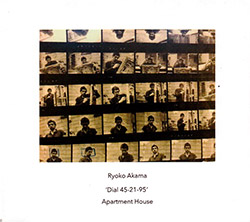
It is getting to the point where sound artist, composer and performer Ryoko Akama should not have a list of roles preceding her name but should just be described as "polymath Ryoko Akama"; the reason for this suggestion is that Dial 45-21-95 adds the designations "cinema archivist" and "sculptor" to the list above. The album comprises a series of pieces commissioned by Another Timbre for Apartment House, whose members play all the music heard on the album. Ryoko created the pieces through her research of Polish film director Krzysztof Kieslowski's archive in Sokolowsko in Poland where he spent his childhood. (Kieslowski, who died in 1996, is best known for his Three Colours trilogy.) The cover photograph is courtesy of the archive, and the album title quotes dialogue from one of Ryoko's favourite Kieslowski films, Przypadek (Blind Chance.) Her investigation of the archive contributed to the scores of nine pieces and also to her sculptural work the way they are which was exhibited at Yorkshire Sculpture Park in June 2019. Yes, polymath.
From her past work, such as the double CD Places and Pages (Another Timbre, 2017), we know that Ryoko's scores are not prescriptive and the resulting realizations can vary greatly in length and content. That proves true here, as two of the nine pieces � "If your tooth hurts it hurts the same" and "A sense of coming back" � each appear in two versions of different lengths (8:30 v 10:37 and 9:46 v 5:07, respectively) with subtly different content, indicating that the score allows the performers to use their discretion. However, despite such variations, there is no great difference in the mood or dynamics between versions, even though the instrumentation is different or, in one case, the venue.
Across the album, the duration of the pieces varies from eighty-two seconds up to thirteen-and-a-half minutes, and the number of players between three and six. Throughout, the music evolves slowly and gently with no shocks or surprises along the way. Ryoko's own words probably describe it best: "I didn't want to create music that would make someone jump with surprise, or start analysing why and how. The idea for these compositions was much simpler. The music here is like you are floating on the ocean, looking at clouds above your head. Your head is empty, with no thoughts. You are experiencing the clouds as clouds, as shape, as light, as colour, as body, as element. I wanted this album to address this sense of you, and this possibility."
Comments and Feedback:



More Recent Reviews, Articles, and Interviews @ The Squid's Ear...


|

